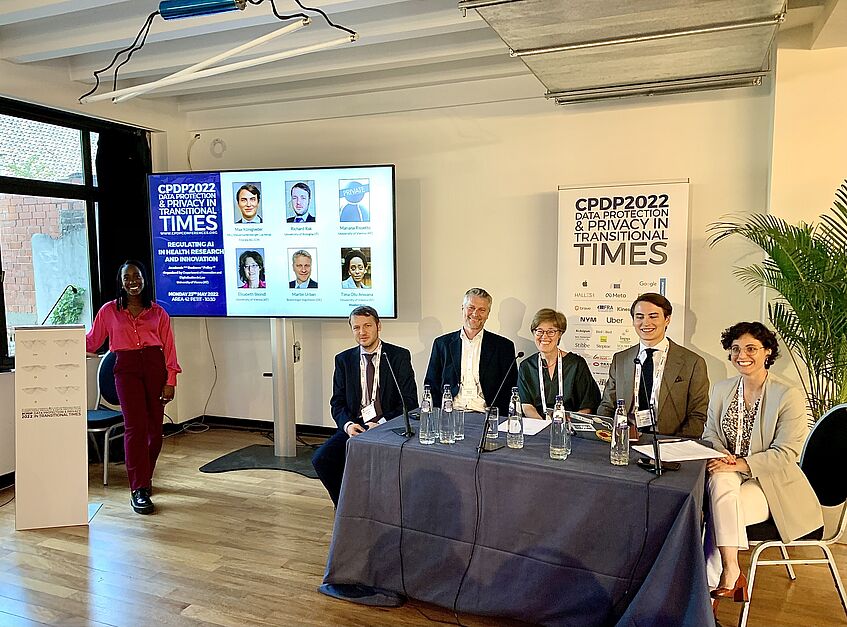CPDP2022: Panel on "Regulating AI in Health Research and Innovation"

by Tima Otu Anwana, Richard Rak, Mariana Rissetto and Elisabeth Steindl
CPDP, the annual conference on Computers, Privacy & Data Protection in Brussels, is known to be one of the biggest and most prestigious conferences in the field of digitalisation and innovation. The multidisciplinary conference is a vivid forum to present, learn about and discuss the state-of-the-art in legal, regulatory, academic and technological development in privacy and data protection. Academics, lawyers, practitioners, policy-makers, industry and civil society from all over the world come together to exchange ideas and views about the latest emerging issues and trends.
This year’s 15th edition of CPDP (CPDP2022) was held from 23 to 25 May 2022 and offered 92 panel sessions with more than 450 international speakers. Over 1400 attendees from 28 countries, 70% of the attendees coming from outside of Belgium, participated in CPDP2022 on “Data Protection and Privacy in Transitional Times”. The full programme is available here.
The Department of ID Law is proud to have been among the institutions chosen to organise a panel for CPDP2022 and thus has formed an integral part of this year’s rich conference programme. Once again, it was also a moment of fruitful collaboration with the Research Platform Governance of Digital Practices, which has been invited to be a component of the panel. The recording of the panel is available on YouTube.
Topic of our panel was "Regulating AI in Health Research and Innovation". The panel consisted of an international line-up of speakers with diverse backgrounds: Max Königseder (MLL Meyerlustenberger Lachenal Froriep AG), Richard Rak (Department of Innovation and Digitalisation in Law, University of Vienna; University of Bologna; University of Turin), Mariana Rissetto (University of Vienna), Elisabeth Steindl (University of Vienna), Martin Urban (Boehringer Ingelheim), and the moderator of the panel, Tima Otu Anwana (University of Vienna).
The speakers addressed questions concerning the proper interpretation, application and interplay of EU regulations in force (GDPR, MDR/IVDR) as well as new legislative initiatives (AIA, European Health Data Space) with regard to the use of AI in healthcare. The debate included critical data protection and AI governance challenges regarding the development and use of AI systems in the area of health innovation and research. In particular, the panel focused on regulatory and governance affairs for AI-supported medical and consumer health devices, with a special focus on mental health applications and consent mechanisms in the pharmaceutical sector. Additionally, the panel discussed entangled topics on anonymization and related risk mitigation measures concerning the use of AI in healthcare, as well as the possible implications of regulating AI in light of the foreseen European Health Data Space by using the case of the Horizon 2020-funded Project titled "TVB-Cloud Project".
The speakers addressed the following questions in their introductory presentations:
What are the possible implications of the AIA for the innovation of Internet of Health Things devices and interconnected AI systems?
Is implementing privacy by design and fostering privacy-enhancing technologies the better way to enable health research on the basis of consent?
What are the concerns of using data-driven technologies in medical & consumer health devices intended to be used for mental health purposes?
What are the legal challenges and risks concerning the anonymisation of health data and how to mitigate the risks associated with re-identification?
Is the interplay between the AIA and the European Health Data Space initiative enough to establish a clear set of rules applicable to AI in health research?
Following their presentations, the speakers answered questions raised by the audience, which encompassed some of the key challenges that data protection professionals in health innovation and research face when AI is deployed within the sector.
The Department of ID Law would like to express its gratitude to the organisers and participants of CPDP2022 for making the conference and lively discussions possible. We look forward to meeting all the participants next year!

